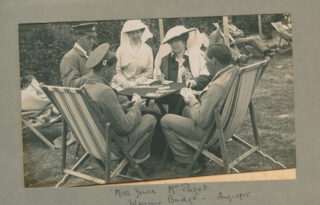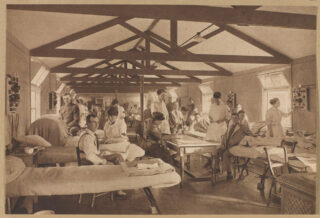American Heiress helps transform care of Wounded Soldiers
Susan Payne
On a summer’s day in 1914 locals at Cole Green railway station may have been surprised when a special train from London deposited hundreds of very well-dressed people on the platform. These were the guests of Almeric and Pauline Payne Whitney Paget, who had leased nearby Panshanger Park.
From the station, the visitors were transported to Panshanger house in a series of buses. Awaiting them were the Pagets, Bonar Law, Arthur Balfour, and other leaders of the Unionist Party. It was reported that a thousand people enjoyed the park grounds, band music and famous Panshanger art collection that day. The final of the Parliamentary Unionists’ tennis championship was held that afternoon, when Lady Pembroke caused a stir by playing an impromptu match, “with arms bared to the elbows”1.
Early life
The party hostess, Pauline Paget, was naturally interested in politics. She had actively supported her husband in his role as the Unionist MP for Cambridge for the previous 4 years. Pauline understood how to organise large social gatherings in wealthy, political and fashionable circles. She was born in 1874, in New York City to William Collins Whitney, financier and politician and Flora Payne, daughter of a senator for Ohio.
As a young woman Pauline was noted in the social columns as an heiress, well-travelled, an excellent linguist, musician, horsewoman and tennis player. But at the age of 20 she fell ill with diphtheria. Pauline survived but her physical health was weakened. To recuperate she travelled to Europe. During the crossing she met Almeric Hugh Paget and married him back in New York in 1895.
Six years later the couple had moved to England, seemingly for Pauline’s health. She seldom returned to the States after 1904. But poor health did not stop the social whirl: she swapped horse-riding for driving around Europe; and tennis for billiards and bridge.
Massage Corps
The outbreak of the 1914-18 war galvanised the couple into founding and financing the Almeric Paget Massage Corps (AMPC), which pioneered the use of massage and electrical simulation as treatments for wounded soldiers. It became what may have been the largest personal undertaking of its kind during the war. During the first two years, the AMPC organised 1,230 masseuses to treat 101,044 patients2. Pauline took a large share of the organisation of the work.
At Panshanger, the AMPC erected and equipped a hospital for 20 discharged soldiers for care and to learn new trades, such as basketmaking, carpentry and cigarette-making.
Pauline’s particular project was a convalescent camp near the coast at Eastbourne called Summerdown and in 1916 the couple moved to Esher to be closer to the camp. In the same year, the AMPC was renamed as the Almeric Paget Military Massage Corps and became the official body for all massage services to the army.
Pauline was described as “Impulsive, warm-hearted, generous and outspoken, she had a personality that could not fail to leave an impression”3. By the end of 1916, the pressure of the work on her poor health led to a period of illness and eventual heart failure. Pauline’s body was brought to Hertingfordbury’s St Mary’s Church on 27th November. Her coffin was borne into the church by 8 wounded soldiers, while others lined the path. The organ was played by a patient from the Summerdown Camp. Almeric raised a fine monument over her grave, with the motto Pro Patria (For Country) over the lintel.
Pauline was survived by her two daughters (Olive Cecilia and Dorothy Wyndham) and Almeric, who went on to marry another American heiress. The Corps was disbanded after the war, when an official Military Massage Service was established.
1 Reported in Manchester Courier 20/07/1914
2 Cambridge Independent Press 1/12/1916
3 Cambridge Independent Press 24/11/1916







Add your comment about this page